NatureCare Beauty: Comprehensive Risk Management Briefing Report
VerifiedAdded on 2023/06/10
|8
|1443
|80
Report
AI Summary
This report provides a comprehensive analysis of NatureCare Beauty's risk management strategies, focusing on the use of eco-friendly and natural ingredients in alignment with the company's commitment to high-quality organic products and adherence to environmental regulations. It examines the political, environmental, social, technological, economic, and legal (PESTLE) factors affecting the company's internal and external environments, and how these factors influence risk management standards. The report also identifies internal and external stakeholders, highlighting their roles and the risks they face. Furthermore, it assesses the strengths and weaknesses of NatureCare's retail approach, including online sales and health food shops, and analyzes critical success factors and goals related to market share, green production, and revenue growth. The company addresses factors such as taxes, environmental regulations, societal expectations, technological advancements, economic inflation, and consumer rights laws.
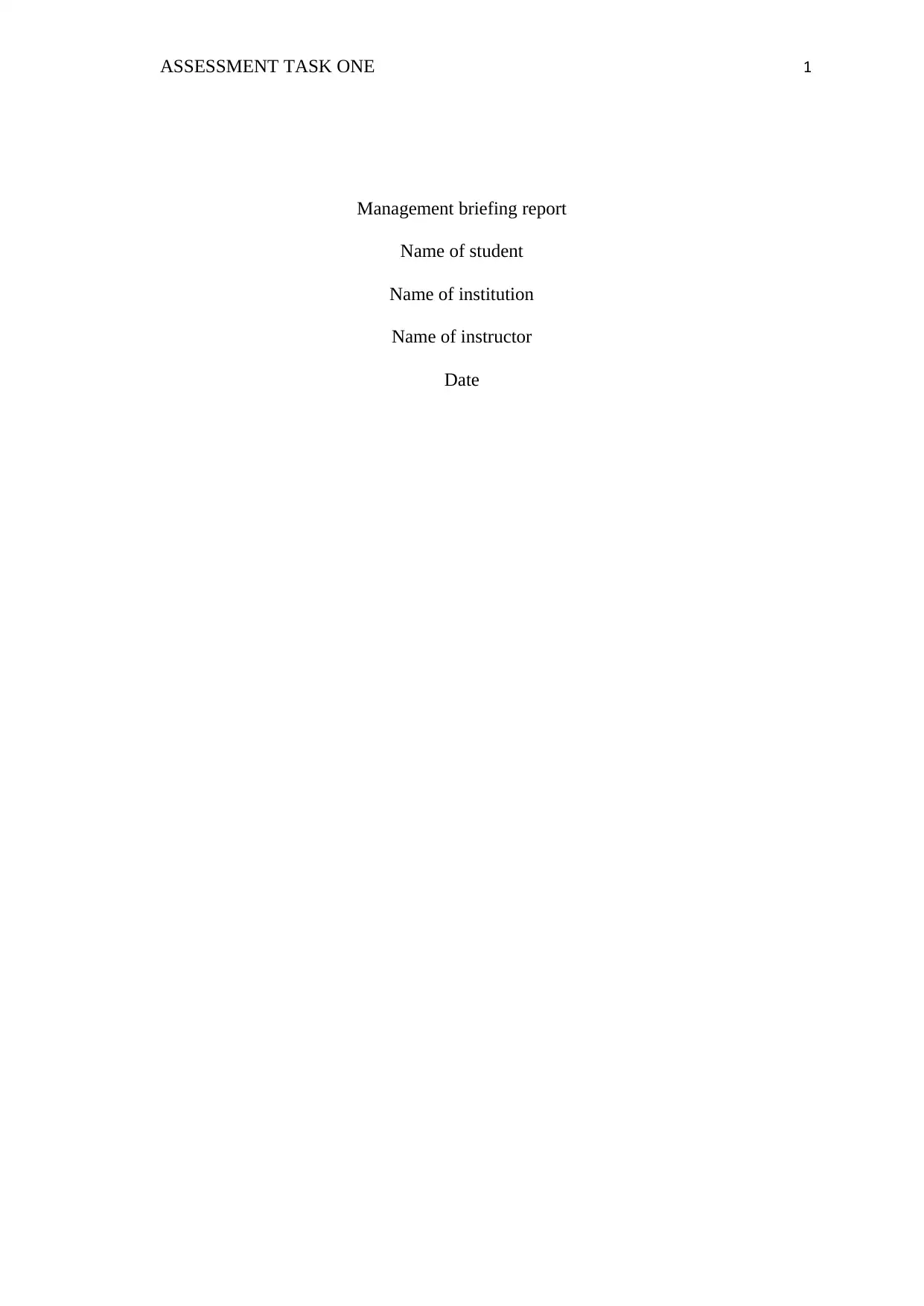
ASSESSMENT TASK ONE 1
Management briefing report
Name of student
Name of institution
Name of instructor
Date
Management briefing report
Name of student
Name of institution
Name of instructor
Date
Paraphrase This Document
Need a fresh take? Get an instant paraphrase of this document with our AI Paraphraser
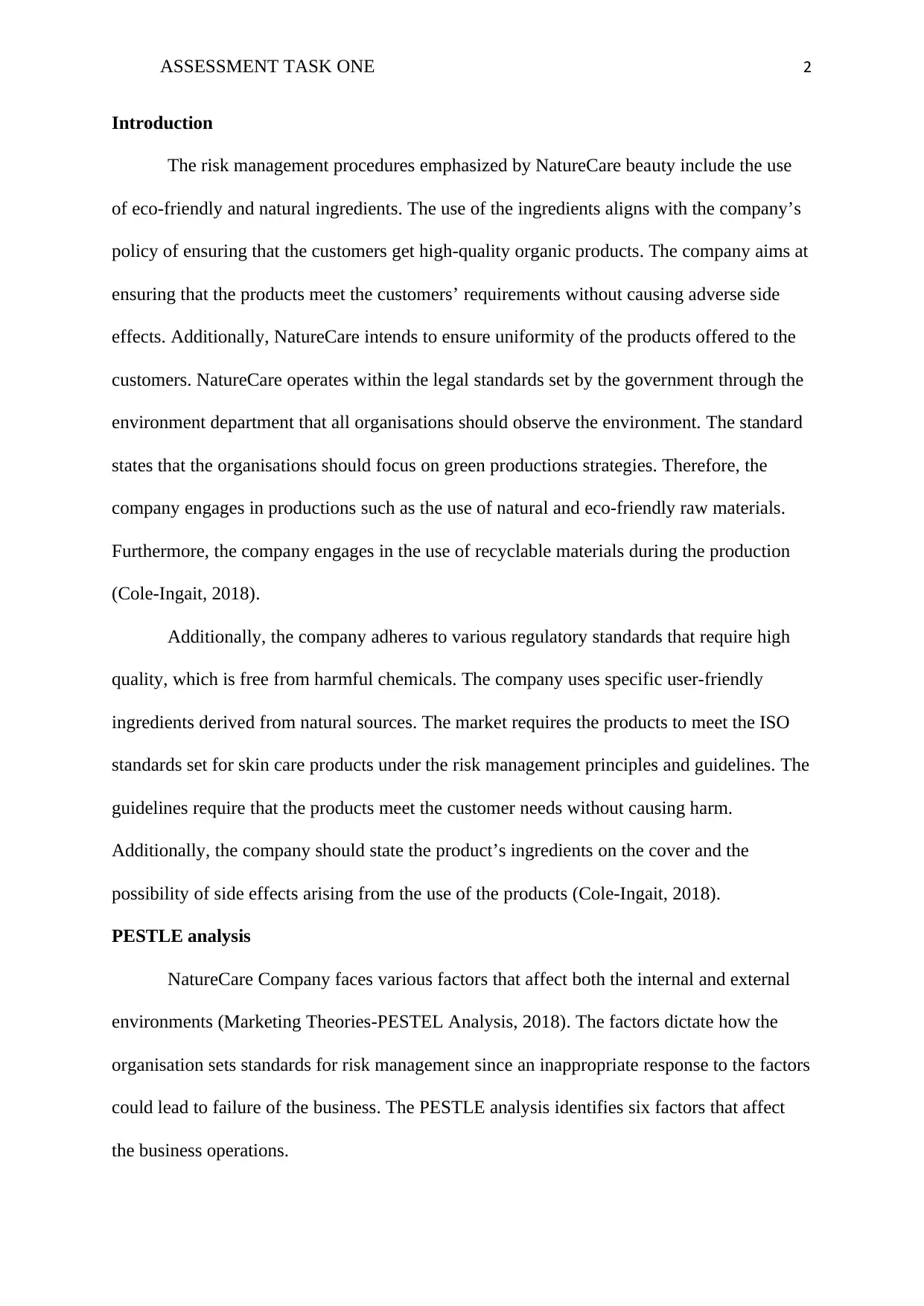
ASSESSMENT TASK ONE 2
Introduction
The risk management procedures emphasized by NatureCare beauty include the use
of eco-friendly and natural ingredients. The use of the ingredients aligns with the company’s
policy of ensuring that the customers get high-quality organic products. The company aims at
ensuring that the products meet the customers’ requirements without causing adverse side
effects. Additionally, NatureCare intends to ensure uniformity of the products offered to the
customers. NatureCare operates within the legal standards set by the government through the
environment department that all organisations should observe the environment. The standard
states that the organisations should focus on green productions strategies. Therefore, the
company engages in productions such as the use of natural and eco-friendly raw materials.
Furthermore, the company engages in the use of recyclable materials during the production
(Cole-Ingait, 2018).
Additionally, the company adheres to various regulatory standards that require high
quality, which is free from harmful chemicals. The company uses specific user-friendly
ingredients derived from natural sources. The market requires the products to meet the ISO
standards set for skin care products under the risk management principles and guidelines. The
guidelines require that the products meet the customer needs without causing harm.
Additionally, the company should state the product’s ingredients on the cover and the
possibility of side effects arising from the use of the products (Cole-Ingait, 2018).
PESTLE analysis
NatureCare Company faces various factors that affect both the internal and external
environments (Marketing Theories-PESTEL Analysis, 2018). The factors dictate how the
organisation sets standards for risk management since an inappropriate response to the factors
could lead to failure of the business. The PESTLE analysis identifies six factors that affect
the business operations.
Introduction
The risk management procedures emphasized by NatureCare beauty include the use
of eco-friendly and natural ingredients. The use of the ingredients aligns with the company’s
policy of ensuring that the customers get high-quality organic products. The company aims at
ensuring that the products meet the customers’ requirements without causing adverse side
effects. Additionally, NatureCare intends to ensure uniformity of the products offered to the
customers. NatureCare operates within the legal standards set by the government through the
environment department that all organisations should observe the environment. The standard
states that the organisations should focus on green productions strategies. Therefore, the
company engages in productions such as the use of natural and eco-friendly raw materials.
Furthermore, the company engages in the use of recyclable materials during the production
(Cole-Ingait, 2018).
Additionally, the company adheres to various regulatory standards that require high
quality, which is free from harmful chemicals. The company uses specific user-friendly
ingredients derived from natural sources. The market requires the products to meet the ISO
standards set for skin care products under the risk management principles and guidelines. The
guidelines require that the products meet the customer needs without causing harm.
Additionally, the company should state the product’s ingredients on the cover and the
possibility of side effects arising from the use of the products (Cole-Ingait, 2018).
PESTLE analysis
NatureCare Company faces various factors that affect both the internal and external
environments (Marketing Theories-PESTEL Analysis, 2018). The factors dictate how the
organisation sets standards for risk management since an inappropriate response to the factors
could lead to failure of the business. The PESTLE analysis identifies six factors that affect
the business operations.
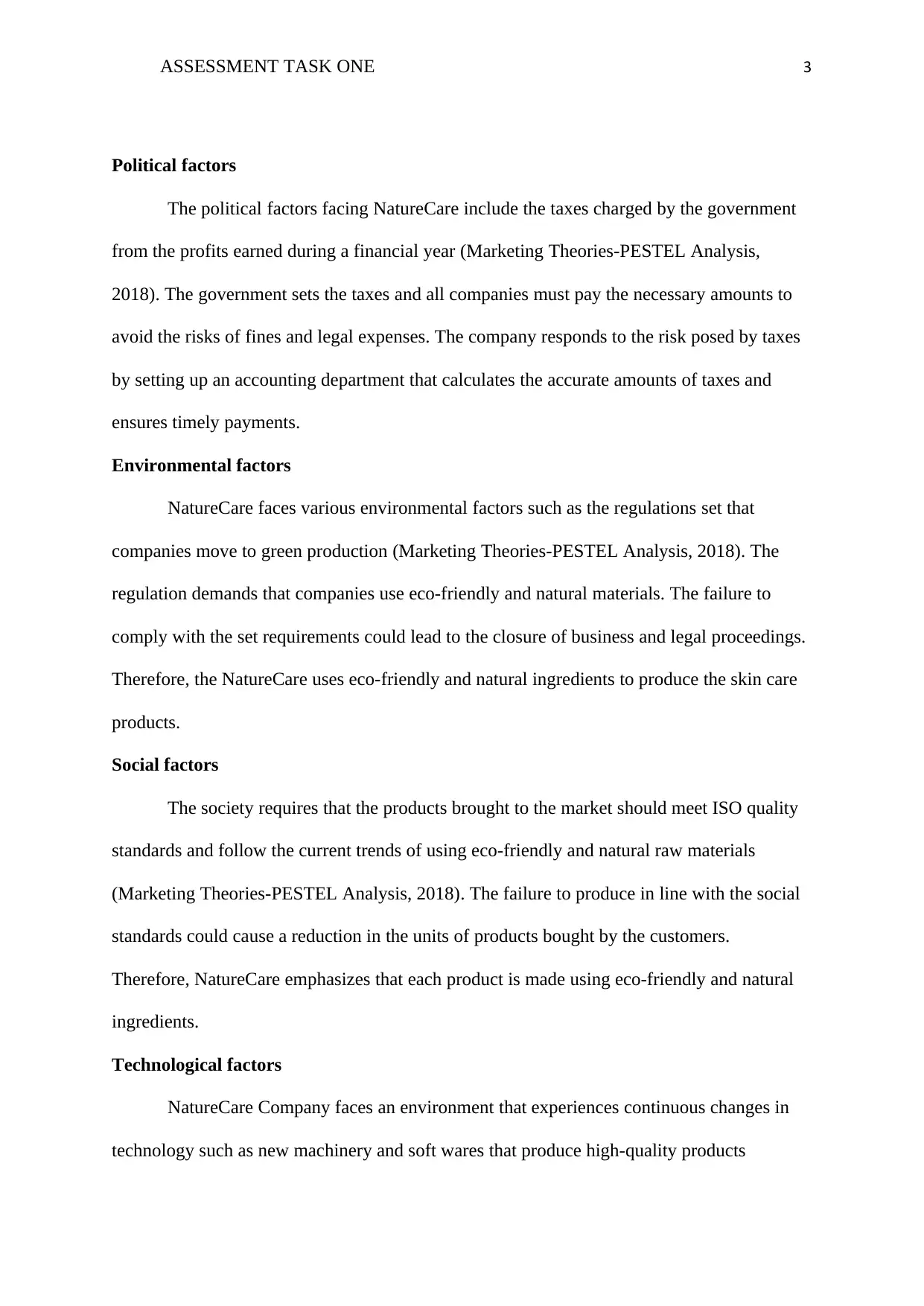
ASSESSMENT TASK ONE 3
Political factors
The political factors facing NatureCare include the taxes charged by the government
from the profits earned during a financial year (Marketing Theories-PESTEL Analysis,
2018). The government sets the taxes and all companies must pay the necessary amounts to
avoid the risks of fines and legal expenses. The company responds to the risk posed by taxes
by setting up an accounting department that calculates the accurate amounts of taxes and
ensures timely payments.
Environmental factors
NatureCare faces various environmental factors such as the regulations set that
companies move to green production (Marketing Theories-PESTEL Analysis, 2018). The
regulation demands that companies use eco-friendly and natural materials. The failure to
comply with the set requirements could lead to the closure of business and legal proceedings.
Therefore, the NatureCare uses eco-friendly and natural ingredients to produce the skin care
products.
Social factors
The society requires that the products brought to the market should meet ISO quality
standards and follow the current trends of using eco-friendly and natural raw materials
(Marketing Theories-PESTEL Analysis, 2018). The failure to produce in line with the social
standards could cause a reduction in the units of products bought by the customers.
Therefore, NatureCare emphasizes that each product is made using eco-friendly and natural
ingredients.
Technological factors
NatureCare Company faces an environment that experiences continuous changes in
technology such as new machinery and soft wares that produce high-quality products
Political factors
The political factors facing NatureCare include the taxes charged by the government
from the profits earned during a financial year (Marketing Theories-PESTEL Analysis,
2018). The government sets the taxes and all companies must pay the necessary amounts to
avoid the risks of fines and legal expenses. The company responds to the risk posed by taxes
by setting up an accounting department that calculates the accurate amounts of taxes and
ensures timely payments.
Environmental factors
NatureCare faces various environmental factors such as the regulations set that
companies move to green production (Marketing Theories-PESTEL Analysis, 2018). The
regulation demands that companies use eco-friendly and natural materials. The failure to
comply with the set requirements could lead to the closure of business and legal proceedings.
Therefore, the NatureCare uses eco-friendly and natural ingredients to produce the skin care
products.
Social factors
The society requires that the products brought to the market should meet ISO quality
standards and follow the current trends of using eco-friendly and natural raw materials
(Marketing Theories-PESTEL Analysis, 2018). The failure to produce in line with the social
standards could cause a reduction in the units of products bought by the customers.
Therefore, NatureCare emphasizes that each product is made using eco-friendly and natural
ingredients.
Technological factors
NatureCare Company faces an environment that experiences continuous changes in
technology such as new machinery and soft wares that produce high-quality products
⊘ This is a preview!⊘
Do you want full access?
Subscribe today to unlock all pages.

Trusted by 1+ million students worldwide
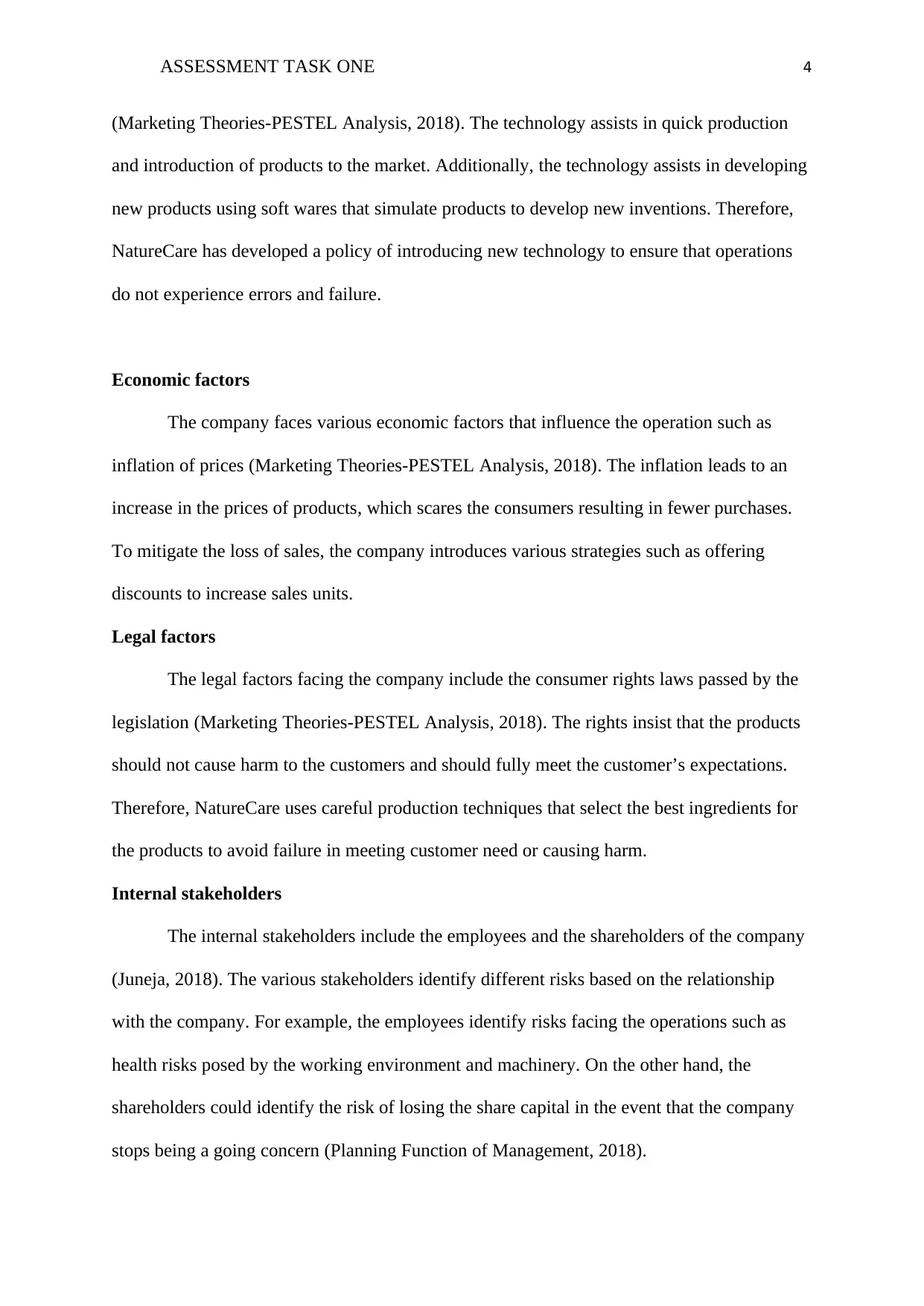
ASSESSMENT TASK ONE 4
(Marketing Theories-PESTEL Analysis, 2018). The technology assists in quick production
and introduction of products to the market. Additionally, the technology assists in developing
new products using soft wares that simulate products to develop new inventions. Therefore,
NatureCare has developed a policy of introducing new technology to ensure that operations
do not experience errors and failure.
Economic factors
The company faces various economic factors that influence the operation such as
inflation of prices (Marketing Theories-PESTEL Analysis, 2018). The inflation leads to an
increase in the prices of products, which scares the consumers resulting in fewer purchases.
To mitigate the loss of sales, the company introduces various strategies such as offering
discounts to increase sales units.
Legal factors
The legal factors facing the company include the consumer rights laws passed by the
legislation (Marketing Theories-PESTEL Analysis, 2018). The rights insist that the products
should not cause harm to the customers and should fully meet the customer’s expectations.
Therefore, NatureCare uses careful production techniques that select the best ingredients for
the products to avoid failure in meeting customer need or causing harm.
Internal stakeholders
The internal stakeholders include the employees and the shareholders of the company
(Juneja, 2018). The various stakeholders identify different risks based on the relationship
with the company. For example, the employees identify risks facing the operations such as
health risks posed by the working environment and machinery. On the other hand, the
shareholders could identify the risk of losing the share capital in the event that the company
stops being a going concern (Planning Function of Management, 2018).
(Marketing Theories-PESTEL Analysis, 2018). The technology assists in quick production
and introduction of products to the market. Additionally, the technology assists in developing
new products using soft wares that simulate products to develop new inventions. Therefore,
NatureCare has developed a policy of introducing new technology to ensure that operations
do not experience errors and failure.
Economic factors
The company faces various economic factors that influence the operation such as
inflation of prices (Marketing Theories-PESTEL Analysis, 2018). The inflation leads to an
increase in the prices of products, which scares the consumers resulting in fewer purchases.
To mitigate the loss of sales, the company introduces various strategies such as offering
discounts to increase sales units.
Legal factors
The legal factors facing the company include the consumer rights laws passed by the
legislation (Marketing Theories-PESTEL Analysis, 2018). The rights insist that the products
should not cause harm to the customers and should fully meet the customer’s expectations.
Therefore, NatureCare uses careful production techniques that select the best ingredients for
the products to avoid failure in meeting customer need or causing harm.
Internal stakeholders
The internal stakeholders include the employees and the shareholders of the company
(Juneja, 2018). The various stakeholders identify different risks based on the relationship
with the company. For example, the employees identify risks facing the operations such as
health risks posed by the working environment and machinery. On the other hand, the
shareholders could identify the risk of losing the share capital in the event that the company
stops being a going concern (Planning Function of Management, 2018).
Paraphrase This Document
Need a fresh take? Get an instant paraphrase of this document with our AI Paraphraser
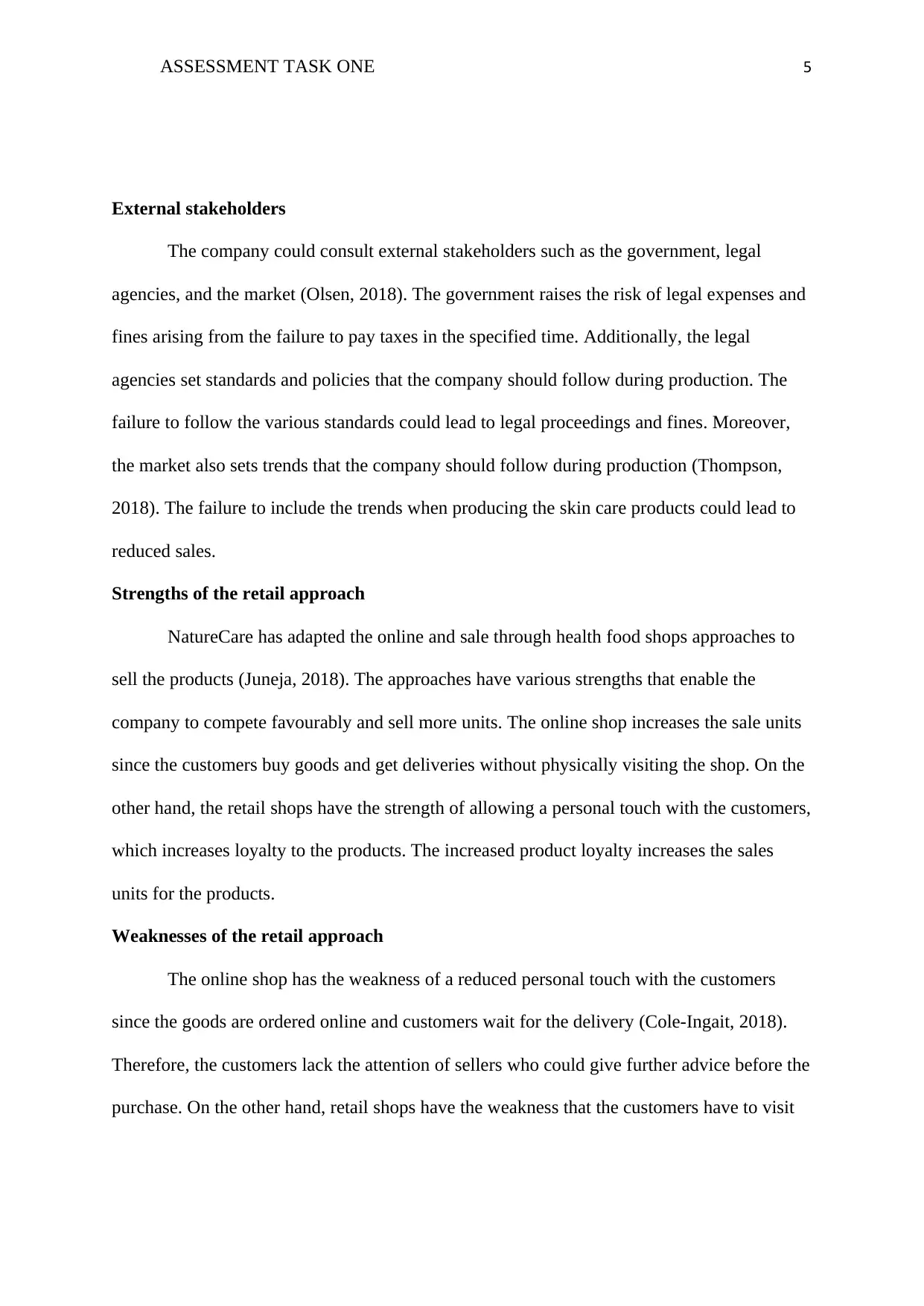
ASSESSMENT TASK ONE 5
External stakeholders
The company could consult external stakeholders such as the government, legal
agencies, and the market (Olsen, 2018). The government raises the risk of legal expenses and
fines arising from the failure to pay taxes in the specified time. Additionally, the legal
agencies set standards and policies that the company should follow during production. The
failure to follow the various standards could lead to legal proceedings and fines. Moreover,
the market also sets trends that the company should follow during production (Thompson,
2018). The failure to include the trends when producing the skin care products could lead to
reduced sales.
Strengths of the retail approach
NatureCare has adapted the online and sale through health food shops approaches to
sell the products (Juneja, 2018). The approaches have various strengths that enable the
company to compete favourably and sell more units. The online shop increases the sale units
since the customers buy goods and get deliveries without physically visiting the shop. On the
other hand, the retail shops have the strength of allowing a personal touch with the customers,
which increases loyalty to the products. The increased product loyalty increases the sales
units for the products.
Weaknesses of the retail approach
The online shop has the weakness of a reduced personal touch with the customers
since the goods are ordered online and customers wait for the delivery (Cole-Ingait, 2018).
Therefore, the customers lack the attention of sellers who could give further advice before the
purchase. On the other hand, retail shops have the weakness that the customers have to visit
External stakeholders
The company could consult external stakeholders such as the government, legal
agencies, and the market (Olsen, 2018). The government raises the risk of legal expenses and
fines arising from the failure to pay taxes in the specified time. Additionally, the legal
agencies set standards and policies that the company should follow during production. The
failure to follow the various standards could lead to legal proceedings and fines. Moreover,
the market also sets trends that the company should follow during production (Thompson,
2018). The failure to include the trends when producing the skin care products could lead to
reduced sales.
Strengths of the retail approach
NatureCare has adapted the online and sale through health food shops approaches to
sell the products (Juneja, 2018). The approaches have various strengths that enable the
company to compete favourably and sell more units. The online shop increases the sale units
since the customers buy goods and get deliveries without physically visiting the shop. On the
other hand, the retail shops have the strength of allowing a personal touch with the customers,
which increases loyalty to the products. The increased product loyalty increases the sales
units for the products.
Weaknesses of the retail approach
The online shop has the weakness of a reduced personal touch with the customers
since the goods are ordered online and customers wait for the delivery (Cole-Ingait, 2018).
Therefore, the customers lack the attention of sellers who could give further advice before the
purchase. On the other hand, retail shops have the weakness that the customers have to visit
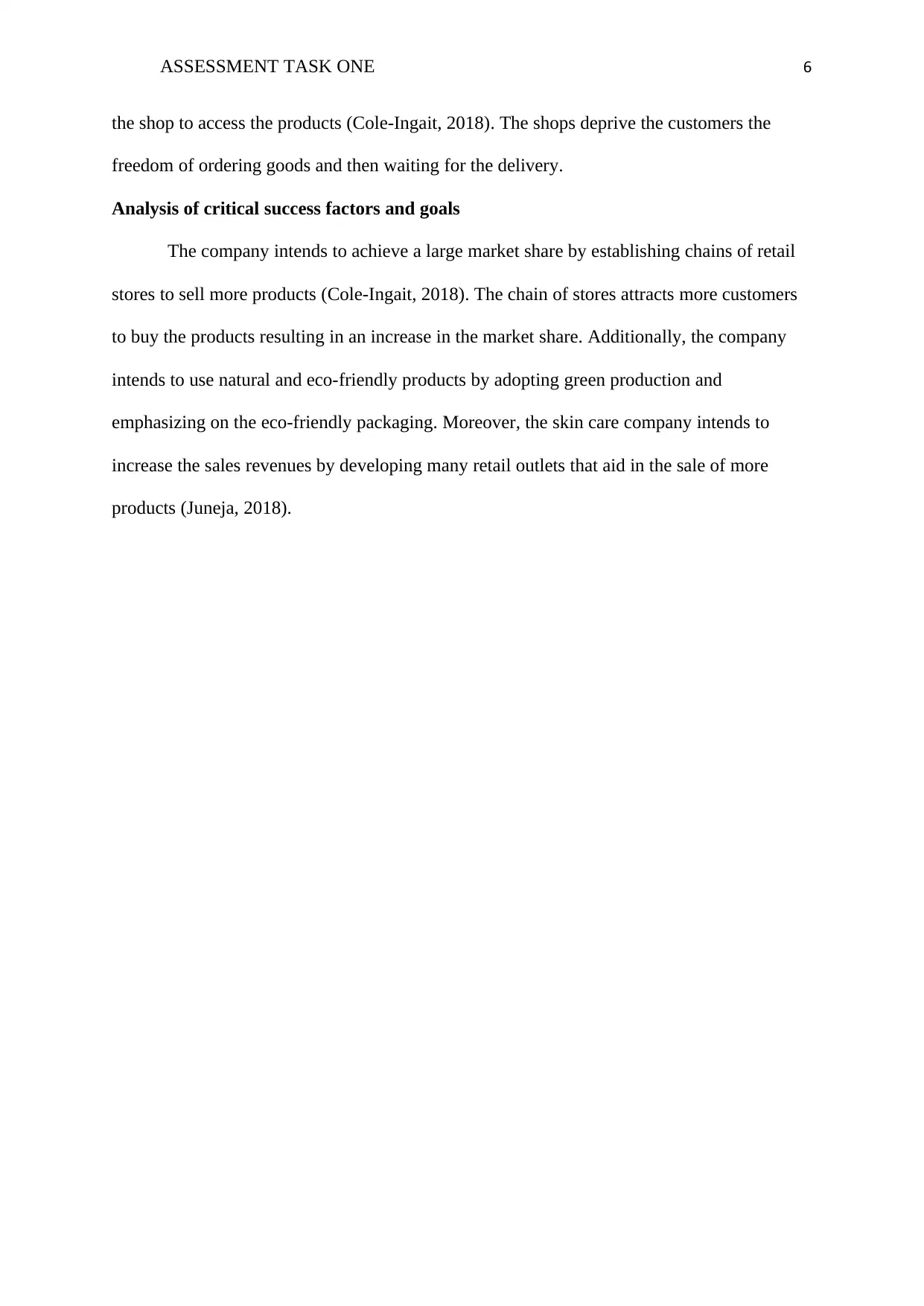
ASSESSMENT TASK ONE 6
the shop to access the products (Cole-Ingait, 2018). The shops deprive the customers the
freedom of ordering goods and then waiting for the delivery.
Analysis of critical success factors and goals
The company intends to achieve a large market share by establishing chains of retail
stores to sell more products (Cole-Ingait, 2018). The chain of stores attracts more customers
to buy the products resulting in an increase in the market share. Additionally, the company
intends to use natural and eco-friendly products by adopting green production and
emphasizing on the eco-friendly packaging. Moreover, the skin care company intends to
increase the sales revenues by developing many retail outlets that aid in the sale of more
products (Juneja, 2018).
the shop to access the products (Cole-Ingait, 2018). The shops deprive the customers the
freedom of ordering goods and then waiting for the delivery.
Analysis of critical success factors and goals
The company intends to achieve a large market share by establishing chains of retail
stores to sell more products (Cole-Ingait, 2018). The chain of stores attracts more customers
to buy the products resulting in an increase in the market share. Additionally, the company
intends to use natural and eco-friendly products by adopting green production and
emphasizing on the eco-friendly packaging. Moreover, the skin care company intends to
increase the sales revenues by developing many retail outlets that aid in the sale of more
products (Juneja, 2018).
⊘ This is a preview!⊘
Do you want full access?
Subscribe today to unlock all pages.

Trusted by 1+ million students worldwide
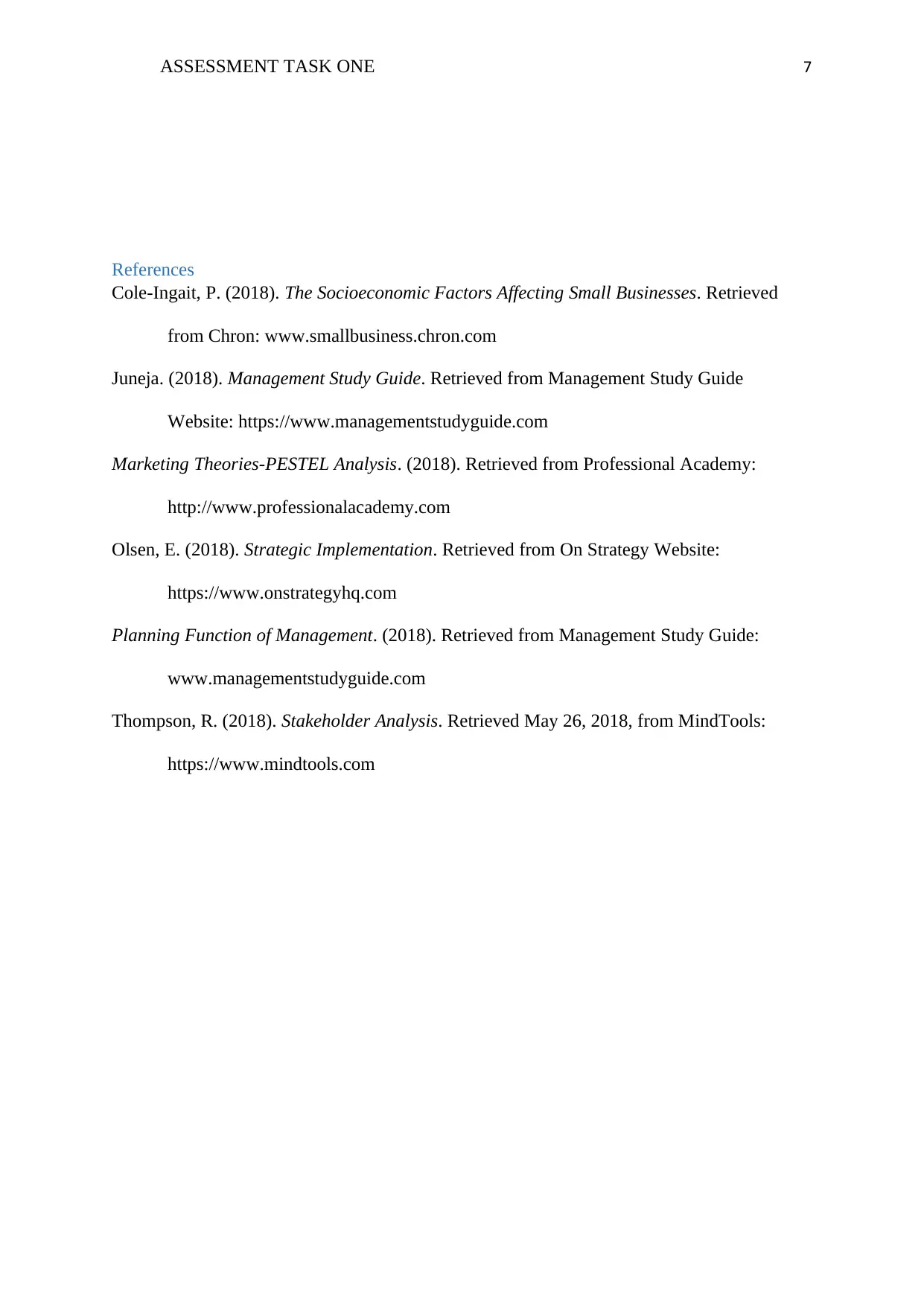
ASSESSMENT TASK ONE 7
References
Cole-Ingait, P. (2018). The Socioeconomic Factors Affecting Small Businesses. Retrieved
from Chron: www.smallbusiness.chron.com
Juneja. (2018). Management Study Guide. Retrieved from Management Study Guide
Website: https://www.managementstudyguide.com
Marketing Theories-PESTEL Analysis. (2018). Retrieved from Professional Academy:
http://www.professionalacademy.com
Olsen, E. (2018). Strategic Implementation. Retrieved from On Strategy Website:
https://www.onstrategyhq.com
Planning Function of Management. (2018). Retrieved from Management Study Guide:
www.managementstudyguide.com
Thompson, R. (2018). Stakeholder Analysis. Retrieved May 26, 2018, from MindTools:
https://www.mindtools.com
References
Cole-Ingait, P. (2018). The Socioeconomic Factors Affecting Small Businesses. Retrieved
from Chron: www.smallbusiness.chron.com
Juneja. (2018). Management Study Guide. Retrieved from Management Study Guide
Website: https://www.managementstudyguide.com
Marketing Theories-PESTEL Analysis. (2018). Retrieved from Professional Academy:
http://www.professionalacademy.com
Olsen, E. (2018). Strategic Implementation. Retrieved from On Strategy Website:
https://www.onstrategyhq.com
Planning Function of Management. (2018). Retrieved from Management Study Guide:
www.managementstudyguide.com
Thompson, R. (2018). Stakeholder Analysis. Retrieved May 26, 2018, from MindTools:
https://www.mindtools.com
Paraphrase This Document
Need a fresh take? Get an instant paraphrase of this document with our AI Paraphraser
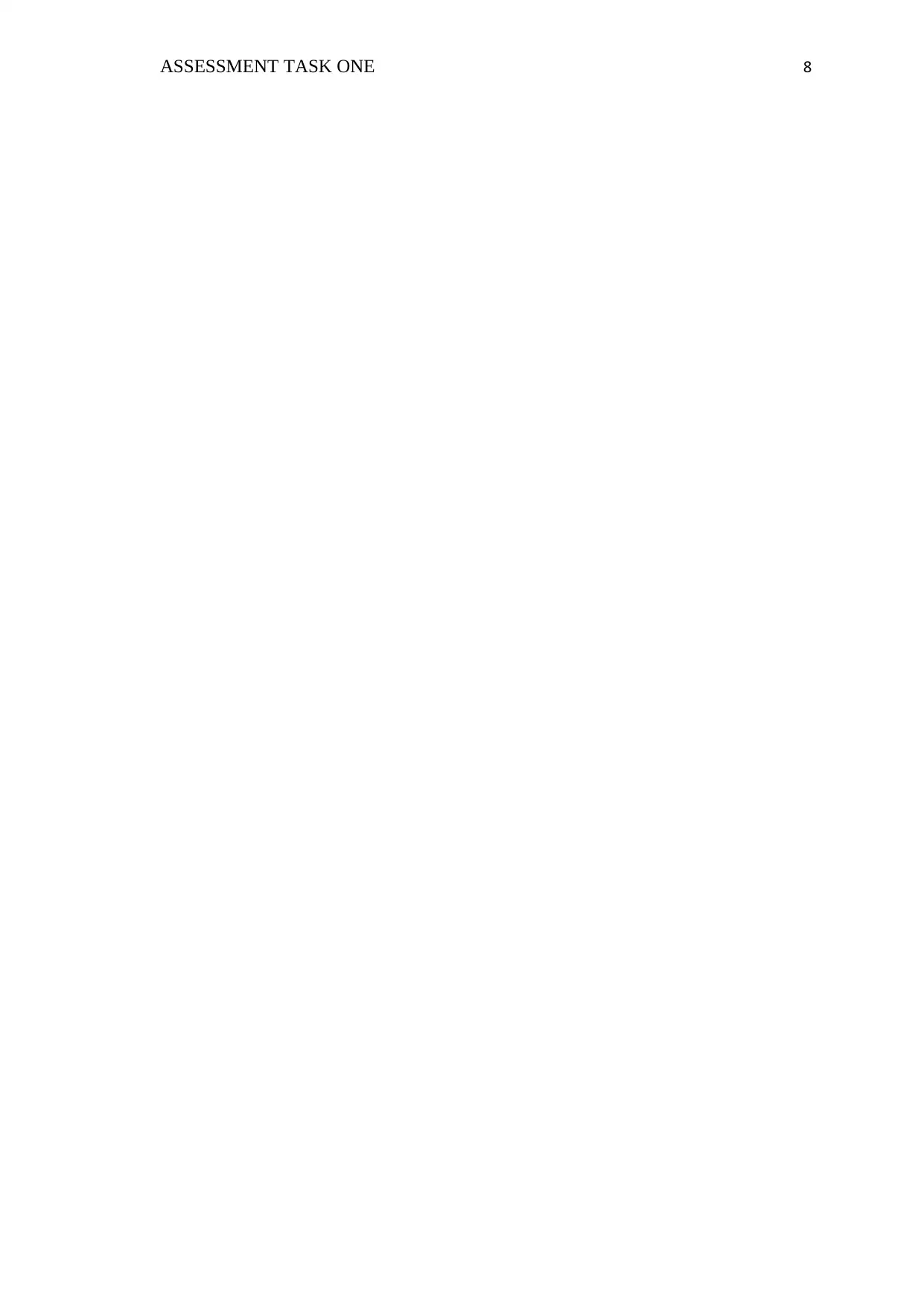
ASSESSMENT TASK ONE 8
1 out of 8
Related Documents
Your All-in-One AI-Powered Toolkit for Academic Success.
+13062052269
info@desklib.com
Available 24*7 on WhatsApp / Email
![[object Object]](/_next/static/media/star-bottom.7253800d.svg)
Unlock your academic potential
Copyright © 2020–2025 A2Z Services. All Rights Reserved. Developed and managed by ZUCOL.




